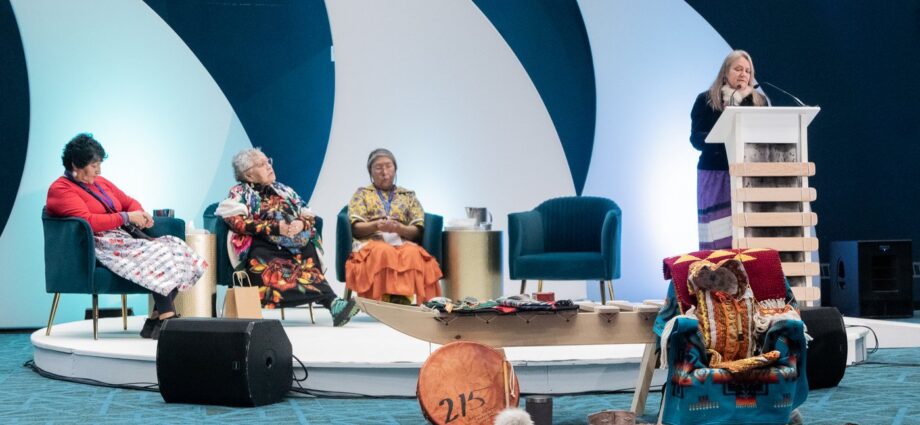
By Jeff Pelletier, Local Journalism Initiative Reporter, Nunatsiaq News
February 2, 2024
On the second day of the National Gathering on Unmarked Burials in Iqaluit, survivors of residential schools and tuberculosis sanitoriums shared their stories and the pain and uncertainty of not knowing where their family members are buried.
The conference, at the Aqsarniit hotel, is bringing together representatives from Indigenous communities from across Canada to hear the northern perspective on the issue of unmarked graves.
The event is led by federally appointed special interlocutorKimberly Murray, who is tasked with preparing a report with recommendations to be presented at a gathering in Ottawa in June.
Three survivors — Navalik Tologanak of Cambridge Bay, Alexina Kublu of Igloolik, and Elise Cardinal of Fort Chipewyan Métis Nation, Alta. — took to the stage at the gathering Wednesday morning.
Tologanak described being taken from her parents and flown to attend a residential school in Inuvik.
She spoke of the devastation of being pulled from her family, but also the joy of reuniting with them months later during the summer.
“That was the best day in our lives, and to this day — I’m almost 70 years old — I celebrate [the] end of June,” she said.
“Let us celebrate our children who don’t have to go to residential school.… No one will ever take my grandchildren again, ever.”
Tologanak also described her family’s pain with the TB sanitoriums.
Her grandparents, she said, died in sanitoriums in the south. To this day, she continues to search to learn where they are buried.
“Where are they? I want to find them, and I want to put a memorial and their name on it but I can’t because I don’t know where they are,” Tologanak said.
“Let us work together to find all our family and put names on the graves or sent them home.… Let’s work together and make this work, and for all the children that never made it home.
Kublu, who spoke in Inuktitut, shared a similar story from her time in residential school and in a sanitorium. She remembered having no one to talk to at times because nobody spoke her language.
She said she knows elders who still seek closure and wonder what ever happened to their children who never came home.
“It’s hard to make it real when you don’t know where they are,” she said.
Murray thanked the survivors for sharing their stories, noting the “experience of colonialism was different here” in the North.
While much of the focus of her portfolio relates to searches at residential school sites, Murray said the legacy of the experiences of Inuit at TB sanitoriums and hospitals in the south also need to be part of the discussions about unmarked graves.
“The geography of the North meant that children were taken tremendous, tremendous distances away from their families and communities, and for many, they were separated from their parents for years on end,” she said.
That’s why everyone is gathered in Iqaluit this week, she said. To discuss how to find the missing children
Following Murray’s remarks, attendees were invited to ask questions of the three panelists, but instead many shared reflections and comments.
Miranda Jimmy, a member of the Thunderchild First Nation, said her community wants to help search for Inuit buried in Treaty 6 territory, which stretches across Alberta and Saskatchewan.
Some Inuit were sent to the former Charles Camsell Hospital in Edmonton for tuberculosis treatment. A search for unmarked graves took place on that site in 2021.
“Your relatives are buried in Treaty 6 territory,” Jimmy said.
“I am honoured to be of service to your community, to your families, to your loved ones, in that search for recognition of your graves,” she said. “I want everyone here and listening online to know that you have allyship, you have relationships in the south, and we want to be of service and we want to support you.”
Wednesday’s gathering continued into the afternoon with a series of breakout sessions. More panel discussions are expected when the gathering continues Thursday, its final day.
Subscribe to our newsletter.
Parts of the event are being streamed on the Office of the Independent Special Interlocutor’s Facebook page.


